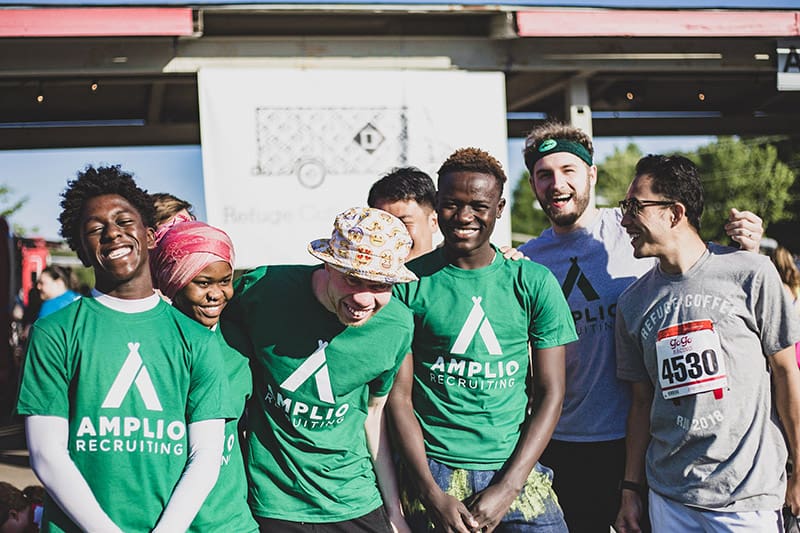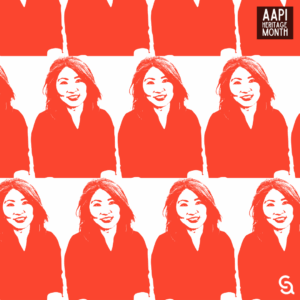CSA is running a series on Business & Justice with series editor Dorcas Cheng-Tozun. As you’ll see in this series, the work of justice is very much happening in the business sector through new technologies and creative business models and through cutting-edge design and savvy distribution. The business leaders you will hear from are building companies that are kingdom-centered and justice-oriented. In these businesses, creativity, generosity, and collaboration thrive, moving us closer to a more equitable distribution of resources and opportunities. Their work truly honors God’s call for us to contribute to the redemption of this planet, and it gives us great hope.
 Today, we welcome Chris Chancey. He and his wife, Sarah, moved to the fringe of a refugee resettlement community in the Atlanta metro area. After a year of learning from their refugee neighbors, they believed there were many refugees looking for good jobs and knew there were many companies looking to hire dependable employees. They launched Amplio Recruiting in 2014 to help great companies hire dependable employees from the refugee workforce. Chris provides operational and financial support to the Amplio team.
Today, we welcome Chris Chancey. He and his wife, Sarah, moved to the fringe of a refugee resettlement community in the Atlanta metro area. After a year of learning from their refugee neighbors, they believed there were many refugees looking for good jobs and knew there were many companies looking to hire dependable employees. They launched Amplio Recruiting in 2014 to help great companies hire dependable employees from the refugee workforce. Chris provides operational and financial support to the Amplio team.
As my wife, Sarah, and I ventured out for errands and meals in our new neighborhood in 2012, we began to meet neighbors who obviously were not native to the U.S. While engaging in conversation, it seemed as if every person had a unique journey to our neighborhood.
 This was about the time we discovered that our community of Clarkston, Georgia, was home to more than 37,000 refugees. It has been commonly referred to as the “most diverse square mile in America.”
This was about the time we discovered that our community of Clarkston, Georgia, was home to more than 37,000 refugees. It has been commonly referred to as the “most diverse square mile in America.”
I began to learn what the term refugee actually meant compared to the political issue it had become. Though I had expected to meet people who might qualify as a “charity case” or a “terrorist threat,” we actually found people who wanted to add value to the local economy. All of those initial conversations ended with people asking me to help them find a job. This was intriguing to me given that, simultaneously, so many local companies seemed to be desperate for good talent.
Some research helped me determine that there was a local labor shortage as well as a national labor shortage. There was also a high percentage of underemployed refugees.
Though there were an ample number of jobs available, most refugees did not possess the confidence, cultural etiquette, or social network of support to help them get those jobs. And though there were an ample number of people from the refugee community willing to work, most companies did not know how to engage them or even that they were able to work.
We had discovered one of the best-kept secrets for revitalizing American companies: the motivated, legal, and dependable refugee workforce.
Amplio Recruiting was born. Since then, Amplio has worked to place over 7,000 refugees into full-time jobs. We operate in 20 cities across the U.S., eclipsing $10 million in revenue in 2021.
Refugees placed by Amplio are from all walks of life: Congolese, Ethiopian, Eritrean, Afghan, Syrian, Iraqi, Nepali, and Burmese employees. Our offices across the country are a melting pot of individuals from many different cultures looking for the right job to provide stability and safety for their families.
Amplio is a temp-to-perm staffing agency, meaning employees start on Amplio’s payroll for a period of time, usually four to six months, before going permanent with the company they are working for. The large majority of Amplio’s corporate clients are in manufacturing, distribution, or hospitality. Our clients include Tesla Motors, Google Fiber, Advanced Auto Parts, Albertsons Grocery, and Chick-fil-A. In 2021, Amplio also contributed to the placement of more than 40 software developers from underrepresented minorities.
In the midst of explosive growth, our team has held tightly to four values. The first value is dependability. It’s a trait that many businesses desire in their employees and the one refugees most notably possess. Dependability is also what the Amplio team expects of each other.
Second, we value gratitude. We often write thank-you notes to our employees, nonprofit partners, and corporate clients. Our company only exists because thousands of people are willing to work long hours in challenging jobs, so we stay grounded in gratitude.
The staffing industry is notorious for burnout, so the final two values relate to the mental and physical posture we strive to maintain in our work. We see buoyancy as rising above and staying afloat no matter the circumstance–as being eternally optimistic. We must be prepared to ride the waves of the staffing industry much like a buoy.
Last, we value consistency, or the opposite of constancy. Constancy is always being at work, hustling, and striving for more. This attitude leads to burnout and broken relationships. In contrast, consistency is working hard but knowing when to step away. It involves being responsible for your commitments but making sure you step away to engage other amazing aspects of life.
Staying grounded in these four values allows us to be effective in a high-stress industry among a high-need community. From a place of health and balance, we can then pour into and serve others.
When we meet a new potential employee, we don’t just consider what job they are physically capable of doing. We also want them to be the healthiest version of themselves, both mentally and spiritually.
This is a question we often ask refugees who come to us: “Is there anything you or your family need that we can pray and ask God to help you with?” As the emotional responses pour out from job candidates, conversations flow from work to family and faith. Prayers often follow, and the stage is set for God to reveal himself in people’s lives. When God shows up to bring healing or provide needed paperwork or an answer to prayer, a discipleship process can begin.
One day, a Muslim Middle Eastern man named Suliman answered with, “Pray God would provide for my family.” As we prayed, he started to weep. We could see God moving in his life. He started a job the following week as a janitor for a commercial cleaning company. When his first check came in, I personally delivered it to his home.
Sadly, Suliman had a heart attack and died only three months later. But, inspired by Amplio’s Jesus-inspired mission, his wife and two children had gotten connected to a local Arabic church. We, alongside that church, have been helping to provide for his family.
Not every prayer has such tangible results. But every prayer represents the needs of people made in the image of God. So, every Friday, our team gathers to pray for each of our employees by name. We also pray for the companies we work with and our church partners.
Amplio also works with church partners across the U.S. to better engage the refugee community. Some churches step in when employees are open to discipleship. Some volunteer to drive employees to and from work until they can afford their own transportation. Others provide job training, skill development, financial resources, and prayer support. The church is a vital partner in the effort to care for our refugee communities.
In 2019, Amplio published Refugee Workforce: The Economic Case for Hiring the Displaced to tell the stories and statistics that capture the impact refugees are having in their local communities. This has given us many opportunities to share about our work, from the Vatican in Rome to the United Nations General Assembly in Geneva.
We celebrate the lower unemployment rates and soaring median household incomes that we’ve seen in the communities we serve.
Perhaps the refugee workforce, the best-kept secret for the American economy, won’t be a secret much longer.
 Series editor: Dorcas Cheng-Tozun is an award-winning writer, editor, communications consultant, and the author of two books on entrepreneurship. She previously served as the first director of communications for leading social enterprise d.light, which has provided solar-powered solutions to more than 125 million people with no or limited access to electricity. Her business writing has appeared in Inc.com, Christianity Today, Unreasonable, BlogHer, Grit & Virtue, and more. Dorcas currently serves as the editorial director of Made for PAX. Her next book, Social Justice for the Sensitive Soul, will be released in 2023. Connect with her at chengtozun.com.
Series editor: Dorcas Cheng-Tozun is an award-winning writer, editor, communications consultant, and the author of two books on entrepreneurship. She previously served as the first director of communications for leading social enterprise d.light, which has provided solar-powered solutions to more than 125 million people with no or limited access to electricity. Her business writing has appeared in Inc.com, Christianity Today, Unreasonable, BlogHer, Grit & Virtue, and more. Dorcas currently serves as the editorial director of Made for PAX. Her next book, Social Justice for the Sensitive Soul, will be released in 2023. Connect with her at chengtozun.com.


